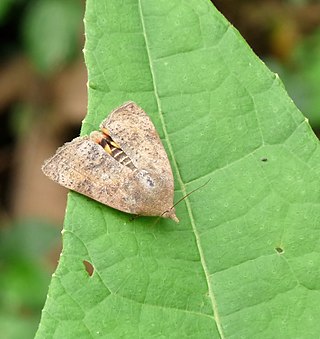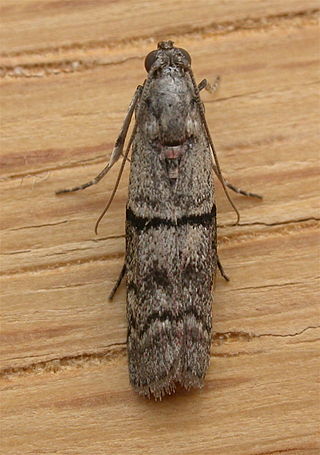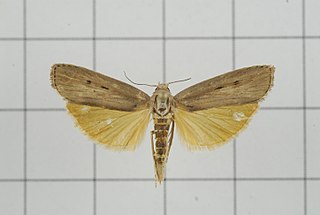
The Crambidae are the grass moth family of lepidopterans. They are variable in appearance, the nominal subfamily Crambinae taking up closely folded postures on grass stems where they are inconspicuous, while other subfamilies include brightly coloured and patterned insects which rest in wing-spread attitudes.

The Pyralidae, commonly called pyralid moths, snout moths or grass moths, are a family of Lepidoptera in the ditrysian superfamily Pyraloidea. In many classifications, the grass moths (Crambidae) are included in the Pyralidae as a subfamily, making the combined group one of the largest families in the Lepidoptera. The latest review by Eugene G. Munroe and Maria Alma Solis retain the Crambidae as a full family of Pyraloidea.

The Pyraloidea are a moth superfamily containing about 16,000 described species worldwide, and probably at least as many more remain to be described. They are generally fairly small moths, and as such, they have been traditionally associated with the paraphyletic Microlepidoptera.

Hyblaeidae are the "teak moths", a family of insects in the Lepidopteran order. The two genera with about 18 species make up one of the two families of the Hyblaeoidea superfamily, which in the past has been included in the Pyraloidea. Recent phylogenetic studies find varying relationships of Hyblaeoidea among Ditrysian Lepidoptera: Mutanen et al. (2010) find the superfamily to group either with Pyraloidea, or – more often – with Thyridoidea or butterflies. The results of Wahlberg et al. (2013) and Heikilä et al. (2015) indicate a sister-group relationship with Pyraloidea.

Spilomelinae is a very species-rich subfamily of the lepidopteran family Crambidae, the crambid snout moths. With 4,135 described species in 344 genera worldwide, it is the most speciose group among pyraloids.
In biological taxonomy, circumscription is the content of a taxon, that is, the delimitation of which subordinate taxa are parts of that taxon. If we determine that species X, Y, and Z belong in Genus A, and species T, U, V, and W belong in Genus B, those are our circumscriptions of those two genera. Another systematist might determine that T, U, V, W, X, Y, and Z all belong in genus A. Agreement on circumscriptions is not governed by the Codes of Zoological or Botanical Nomenclature, and must be reached by scientific consensus.

Myelois is a genus of small moths belonging to the family Pyralidae. They are found in western Eurasia and adjacent regions such as the Maghreb.
Apomyelois is a genus of small moths belonging to the family Pyralidae. The genus was erected by Carl Heinrich in 1956.

Ectomyelois ceratoniae, the locust bean moth, more ambiguously known as "carob moth", is a moth of the family Pyralidae. It has a nearly cosmopolitan distribution.
Apomyelois artonoma is a species of snout moth in the genus Apomyelois. It was described by Edward Meyrick in 1935. It is found on Java in Indonesia.
Apomyelois bicolorata is a species of snout moth in the genus Apomyelois. It was described by Boris Balinsky in 1991 and is known from South Africa.

Apomyelois bistriatella is a species of snout moth in the genus Apomyelois. It was described by George Duryea Hulst in 1887. It is known from California, the eastern United States, northern Europe and Russia.
Apomyelois cognata is a species of snout moth in the genus Apomyelois. It was described by Staudinger in 1871, originally in genus Myelois.
Apomyelois decolor, the Caribbean dried fruit moth, is a species of snout moth in the genus Apomyelois. It was described by Philipp Christoph Zeller in 1881. It is found in France, Florida, the Antilles, Central America and South America.

The Phycitini are a tribe of moths of the family Pyralidae.
Ectomyelois is a genus of small moths belonging to the family Pyralidae.

The Anerastiini are a tribe of moths of the family Pyralidae.

Tirathaba mundella, the oil palm bunch moth, is a species of snout moth. It is found in Malaysia.

Glaphyriinae is a subfamily of the lepidopteran family Crambidae. It was described by William Trowbridge Merrifield Forbes in 1923. The subfamily currently comprises 509 species in 75 genera.

Scopariinae is a subfamily of the lepidopteran family Crambidae. The subfamily was described by Achille Guenée in 1854.











